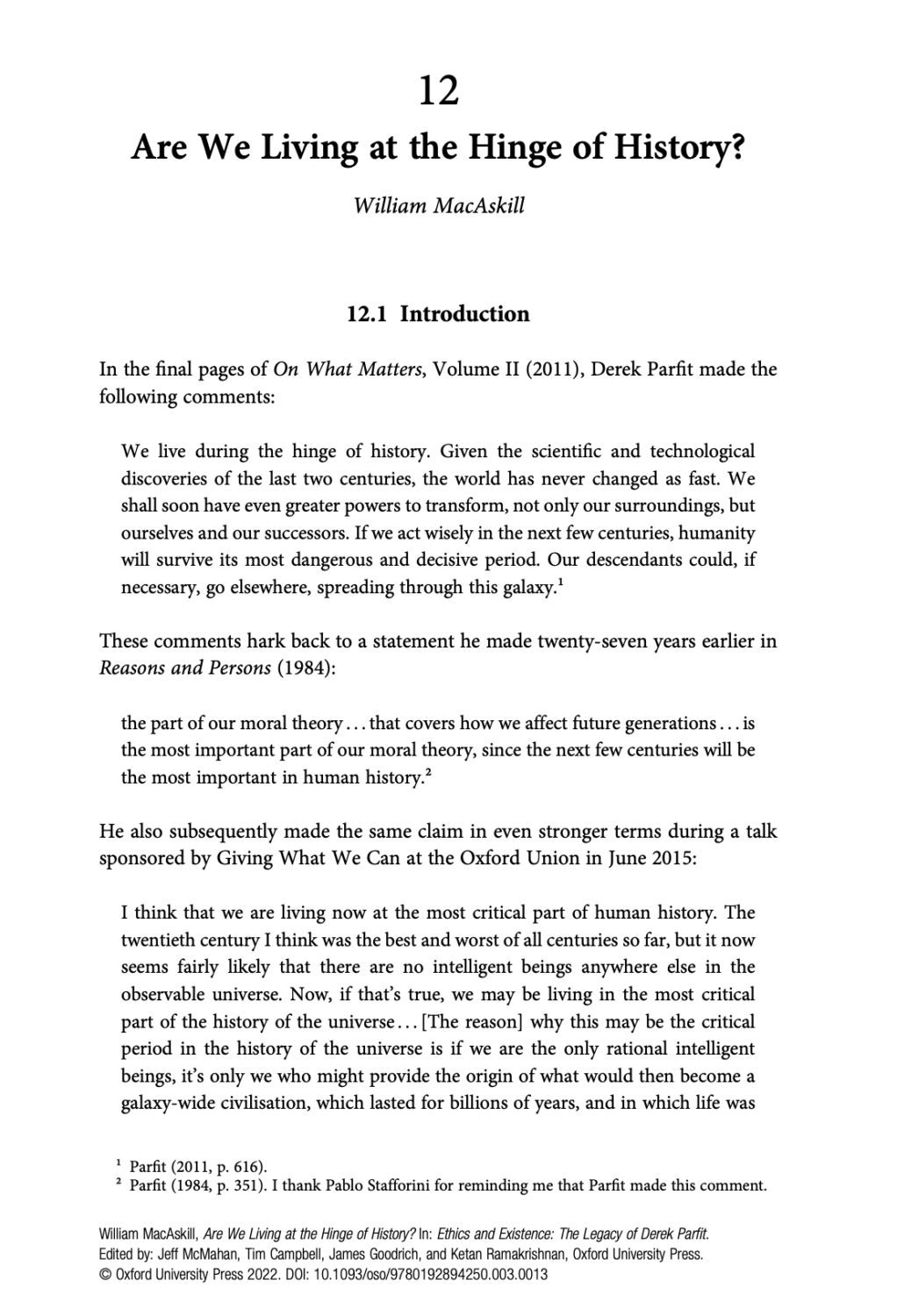Are we living at the hinge of history?
William MacAskill (Global Priorities Institute, Oxford University)
GPI Working Paper No. 12-2020, published in Ethics and Existence: The Legacy of Derek Parfit
In the final pages of On What Matters, Volume II, Derek Parfit comments: ‘We live during the hinge of history... If we act wisely in the next few centuries, humanity will survive its most dangerous and decisive period... What now matters most is that we avoid ending human history.’ This passage echoes Parfit's comment, in Reasons and Persons, that ‘the next few centuries will be the most important in human history’.
But is the claim that we live at the hinge of history true? The argument of this paper is that it is not. The paper first suggests a way of making the hinge of history claim precise and action-relevant in the context of the question of whether altruists should try to do good now, or invest their resources in order to have more of an impact later on. Given this understanding, there are two worldviews - the Time of Perils and Value Lock-in views - on which we are indeed living during, or about to enter, the hinge of history.
This paper then presents two arguments against the hinge of history claim: first, that it is a priori extremely unlikely to be true, and that the evidence in its favour is not strong enough to overcome this a priori unlikelihood; second, an inductive argument that our ability to influence events has been increasing over time, and we should expect that trend to continue into the future. The paper concludes by considering two additional arguments in favour of the claim, and suggests that though they have some merit, they are not sufficient for us to think that the present time is the most important time in the history of civilisation.
Other working papers
Towards shutdownable agents via stochastic choice – Elliott Thornley (Global Priorities Institute, University of Oxford), Alexander Roman (New College of Florida), Christos Ziakas (Independent), Leyton Ho (Brown University), and Louis Thomson (University of Oxford)
Some worry that advanced artificial agents may resist being shut down. The Incomplete Preferences Proposal (IPP) is an idea for ensuring that does not happen. A key part of the IPP is using a novel ‘Discounted Reward for Same-Length Trajectories (DReST)’ reward function to train agents to (1) pursue goals effectively conditional on each trajectory-length (be ‘USEFUL’), and (2) choose stochastically between different trajectory-lengths (be ‘NEUTRAL’ about trajectory-lengths). In this paper, we propose…
Numbers Tell, Words Sell – Michael Thaler (University College London), Mattie Toma (University of Warwick) and Victor Yaneng Wang (Massachusetts Institute of Technology)
When communicating numeric estimates with policymakers, journalists, or the general public, experts must choose between using numbers or natural language. We run two experiments to study whether experts strategically use language to communicate numeric estimates in order to persuade receivers. In Study 1, senders communicate probabilities of abstract events to receivers on Prolific, and in Study 2 academic researchers communicate the effect sizes in research papers to government policymakers. When…
How to resist the Fading Qualia Argument – Andreas Mogensen (Global Priorities Institute, University of Oxford)
The Fading Qualia Argument is perhaps the strongest argument supporting the view that in order for a system to be conscious, it does not need to be made of anything in particular, so long as its internal parts have the right causal relations to each other and to the system’s inputs and outputs. I show how the argument can be resisted given two key assumptions: that consciousness is associated with vagueness at its boundaries and that conscious neural activity has a particular kind of holistic structure. …

